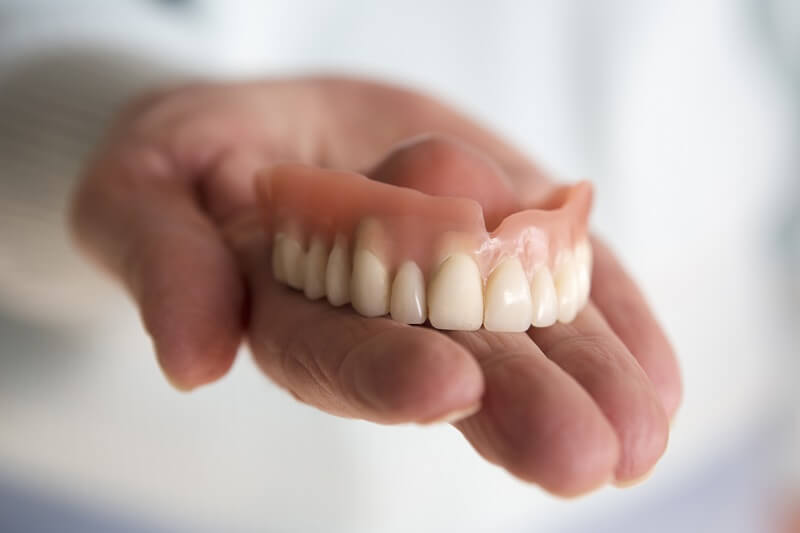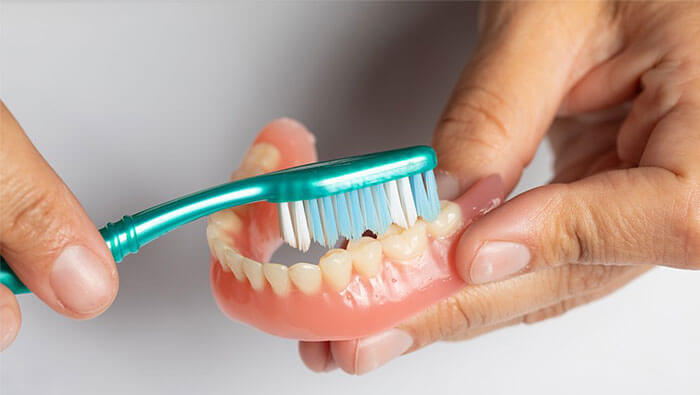Whether you have new partial or full dentures, learning how to clean your dentures is essential. Proper cleaning helps maintain the life of your dentures and promotes good oral health. At Soundview Family Dental, we are here to help you better understand good denture care and maintenance, including basic facts about dentures and how to clean denture stains.
Key Takeaways
- Clean your dentures daily with a soft bristle brush and water, avoiding toothpaste.
- Brush your gums, roof of mouth, and tongue to remove food particles and microorganisms.
- Rinse your mouth and dentures after meals to reduce food particle buildup.
- Soak dentures in warm water with a denture cleaner to sanitize and freshen.
- Avoid using abrasive products like bleach or files to remove stains, and consider professional cleaning for stubborn stains.

Why do you need to clean your dentures?
Because your dentures are not real teeth, you may assume that regular cleaning is not as important. Unfortunately, this is not the case. The truth is, dentures can harbor microorganisms the same as natural teeth. A buildup of these microorganisms can negatively affect the look of your dentures, as well as your overall health. Some common complications associated with poor denture care can include:
- Cosmetic Changes – Ignoring a regular denture cleaning schedule can contribute to cosmetic changes to your denture, including staining. Trying to remove stains with abrasive measures can further damage the denture. When microorganisms build upon the denture, they can degrade the material, eventually changing the shape and affecting how the denture fits and appears.
- Fungal Infections – The main complication from unclean dentures that can contribute to pain and discomfort is thrush. Thrush is an overgrowth of the fungus Candida albicans. When this fungus builds up, it can lead to inflammation and bright red and tender gums. It typically occurs on the roof of the mouth and is a more common problem in people that suffer from dry mouth. Thrush requires anti-fungal medication. During treatment, you will need to take a break from wearing your dentures.
- Mouth Sores – Unclean dentures often have a buildup of food particles. As these food particles build up, they can contribute to sore spots and irritation along your gum line, leading to mouth sores and ulcers.
- Bad Breath – As bacteria build up on your dentures, it can contribute to bad breath.
How to clean dentures
While dentures may seem the same as your natural teeth, they are quite different. This difference requires specialized cleaning techniques. You cannot just simply grab a toothbrush and toothpaste and brush away. These step by step tips will help to ensure you thoroughly clean your dentures and help to avoid any possible complications or damage.
- Use Care When Handling Dentures – Your dentures can chew food and are exceptionally durable when in your mouth. However, they can be very fragile when outside of the mouth. Whenever you remove your denture from your mouth, make sure you are doing so over a soft surface in case you drop them. Consider placing a towel on the counter or filling the sink with water before you remove the denture.
- Brush Dentures Daily – Like your natural teeth, your dentures need daily brushing to remove food and plaque buildup. The difference is, dentures require a specialized soft bristle brush. A regular toothbrush can be too abrasive and damage the surface of the denture. The same is true about toothpaste. Do NOT use toothpaste on your dentures as it can cause microscopic scratches on your denture surface. Gently brush your denture with water and rinse.
- Do Not Forget Your Gums – While cleaning your denture is essential, so is cleaning your gums and mouth. A clean denture will not help if you place it inside a bacteria-filled mouth. Using a soft-bristled toothbrush and toothpaste, gently brush your gums, the roof of your mouth, and your tongue to remove any food particles and microorganisms.
- Rinse Your Mouth and Denture After Meals – To help reduce the buildup of food particles in between brushings, it is good to get into the habit of rinsing out your mouth and dentures after you eat. This is especially important after drinking coffee, tea, or red wine and eating foods such as tomato sauce or fresh berries.
- Soak with a Denture Cleaner – Anytime you are not wearing your denture, place it into a denture container filled with warm water. Letting your denture dry out can cause changes in shape. When you soak your denture, adding a denture-cleaning tablet helps to sanitize and freshen your denture. When you remove the denture from the solution, gently brush and rinse.
Denture stain removal
Despite regular cleaning, dentures can still develop discolorations and stains. When this occurs, do not attempt to use abrasive products, such as bleach or a file, to remove the stains. These can seriously damage your dentures. One option to address stain removal is the use of an ultrasonic cleaner. These specialized devices suspend the denture in a cleaning solution while ultrasonic waves work to remove stains and discoloration.
While this cleaning method can work, yearly visits to your dentist for professional cleaning can help to remove stubborn stains without the risk of potential damage to the denture. This visit also allows the dentist to inspect the denture and your mouth so they can catch any potential concerns before they become real problems.
Things to avoid when cleaning your dentures
While learning how to clean your dentures is essential, it is also important to know what to avoid when cleaning your dentures. Here is a list of things not to do when cleaning your dentures:
- Do NOT use standard toothbrushes and toothpaste as they are too abrasive and can damage your denture.
- Do NOT use bleach or other whitening products on your dentures. They will not remove stains or whiten your dentures and these chemicals can cause erosion of the denture.
- Always use warm water when rinsing or soaking your dentures. Hot water can soften the denture and cause changes in the shape and affect how the denture fits in your mouth.
If you have any questions about restorative dentistry, denture care, and cleaning, are experiencing changes in denture fit, or have some denture staining, Soundview Family Dental is here to help. Contact us online today or give us a call at (425) 563-6360


